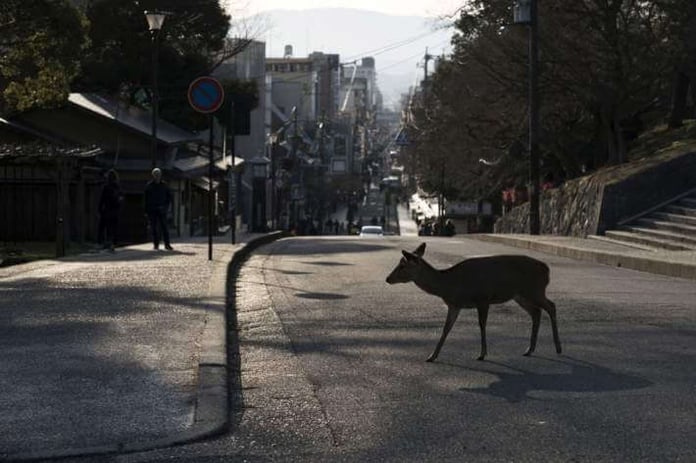Madrid (TEH) – A young puma roams Chile’s capital Santiago, wild boars walk on the luxury avenues in Barcelona and peacocks calmly stroll through the center of Madrid. The strict curfew affects everything in Spain, which has been hard hit by the corona pandemic Apparently on the behavior of animals that are otherwise only in the woods, in rural areas or directly on the water.
But also in other countries, animals seem to want to recapture the rooms most recently left by humans because of the virus. EXPERTS SEE RELATIONSHIP TO CORONA There are more and more videos of the “cheeky” wild animals on the net. The experts in Spain don’t believe in coincidence. Rather, they are convinced that there is a connection between the consequences of the pandemic and animal behavior. The fact that the cities in Spain have been partially empty since the strict curfew came into effect on March 15th, that the environment is much cleaner and there is much less traffic, has “a balm effect for the animal world”, says Roberto Hartasánchez from the foundation Protection of wild animals (fapas).
A gel Sán chez from the Iberian Wolf Volunteer Association told the newspaper “El País” that there are several reports that this predator has also recently ventured into inhabited areas. ANIMAL PROTECTORS HOPE POSITIVE IMPACT OF THE VIRUS “We expect the wolves to be more successful in reproduction because they are now less likely to be disturbed, “said Sánchez. In Almería, Andalusia, Emilio González from the environmental protection organization Serbal also hopes that the new situation will help some of the endangered or endangered species – such as the hawk-eagle or the European wildcat – to reproduce better.
NOT ONLY IN CITIES THE (POSITIVE) CORONA FOLLOWABLE “In the country, we currently see more pairs of birds of prey, martens, more generally predators and herbivores,” says the president of the organization for the rehabilitation of native fauna (Grefa), Ernes To Al VA rez. The expert notes that because of the curfew, “everything has disappeared”: “The many hikers and cyclists, the athletes who train, are suddenly all gone.” In the region around Madrid, there are, for example, “five or six pairs of hawk eagles, which therefore have much better prospects.” Ge rar do Ba gue na sees it similarly: “There are currently no mountaineers, no paragliding flights “No helicopters, nothing,” says the head of the Spanish Foundation for the Bearded Vulture.
This bird, the largest in Europe with a wingspan of around three meters, is in danger of extinction. In Bavaria, conservationists try to resettle the animal around 100 years after it has completely disappeared. Now experts hope for positive side effects of the current situation. Baguena: “We estimate that the number of chicks that will be able to fly in the Central Pyrenees will climb from 22 to 30. That would be a record in 25 years of observation. “BUT NOT ONLY CONQUERING THE CITIES IN SPAIN Even in Wales, South America, and Asia, animals that otherwise only rarely venture into the rooms inhabited by humans are becoming braver and braver. In Chile’s capital Santiago, a young puma roamed the streets. The animal came down into the city looking for prey from the nearby mountains.
Since there were hardly any people on the streets, the puma ran into the residential areas. According to the authorities, the slightly more than one-year-old specimen was stunned, examined and later released back into the wild. According to a report by the newspaper “Haaretz”, ten jackal families lived in Hajarkon City Park before the Corona crisis. But since extensive exit restrictions also apply in Israel, the animals are now increasingly showing up on park paths.
In the meantime, a particularly large number of monkeys and dogs frolic on the empty streets of the capital cities of India and Nepal, where wild cashmere goats roamed the almost deserted streets in the seaside resort of Llandudno. The animals recently came down from a small mountain in the north of Wales and have been walking through the town on the Irish Sea ever since. Your favorite food: the hedges. Some residents call the goats “vandals” because they are not the first time they have been walking through the city and, among other things, are said to have already destroyed the newly planted trees in front of a school. In Venice, people posted pictures and videos of channels that appear cleaner than usual and returned to the fish.
“Nature is taking back its space,” writes users of the Venezia Pulita (Clean Venice) group. In Milan, swans caused a sensation in the “Navigli”, a canal system. Foxes were sighted in Bogotá, coyotes in San Francisco, and a whole herd of deer that had escaped from a park in Nara, Japan. THE PANDEMIC IS NOT WELCOME TO MANY ANIMALS, BUT THE World Wildlife Fund in Spain expressed concern that the pandemic was a settlement project for griffon vultures in Segovia near Madrid. The reason: All restaurants are closed, the scavenger will, therefore, find hardly any food. Where fewer people are on the move, there are logically fewer food scraps – but which are essential for some animals.
In the Thai province of Lop Buri, for example, monkeys were filmed, who fought particularly violently over food scraps. A passer-by in the Spanish holiday stronghold of Benidorm, who is otherwise crowded in the spring, experienced an “attack” on an empty street, which was directed at Alfred -Hitchcock thriller “The Birds” from 1963 recalled. The older woman with a shopping trolley was fluttered by a flock of white doves. Many Spaniards say that many birds have recently been much more aggressive. “The pigeons are hungry,” headlined the newspaper “La Vanguardia”.


